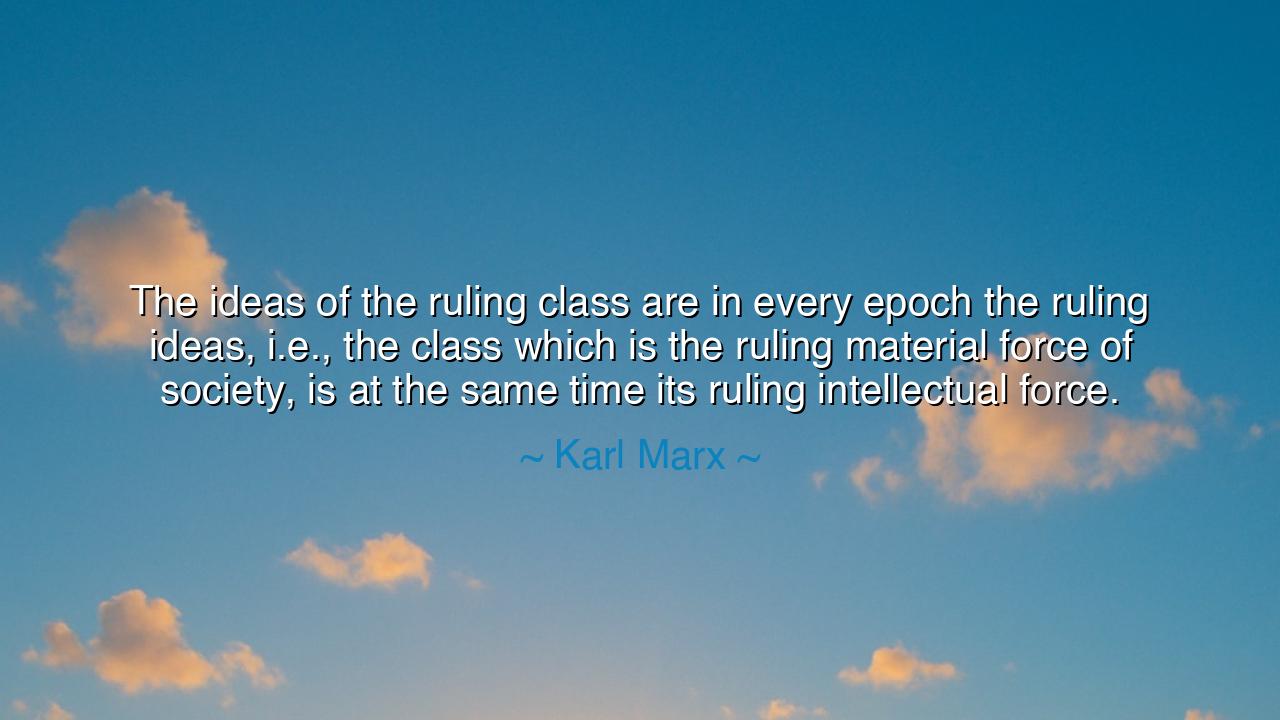
The ideas of the ruling class are in every epoch the ruling
The ideas of the ruling class are in every epoch the ruling ideas, i.e., the class which is the ruling material force of society, is at the same time its ruling intellectual force.






The revolutionary thinker Karl Marx spoke with fierce clarity when he declared: “The ideas of the ruling class are in every epoch the ruling ideas, i.e., the class which is the ruling material force of society, is at the same time its ruling intellectual force.” These words are not only the cry of a philosopher, but the unveiling of a law of history. For Marx, it was not chance or divine ordination that shaped the beliefs of men, but the dominion of those who held power, wealth, and control. The ruling class, those who command the material strength of armies, land, and gold, also commands the unseen strength of ideas—defining what is “true,” what is “moral,” what is “just.”
To understand this is to see that thought itself is never neutral. The ruling intellectual force of a society often serves the interests of those who dominate it. In the age of kings, divine right was the ruling idea, sanctifying monarchy as eternal and unquestionable. In the age of merchants and capitalists, free markets and private property became the ruling truths, proclaimed as natural law. Each age clothes its rulers not only in crowns or titles, but also in the authority of philosophy, religion, and culture. Thus, Marx’s words tear away the veil: the truths of society are often the truths of its masters.
History confirms this harsh wisdom. Consider the long night of feudal Europe, where serfs were bound to the land and lords claimed dominion by divine will. The Church, allied with the nobility, spread the idea that such hierarchy was ordained by God Himself. The poor believed it, because every voice of authority declared it so. The ruling class, wielding both sword and scripture, ruled also the mind. Only with the fires of revolt and the birth of new ideas did these chains begin to break.
Or look to the American Gilded Age, when industrial magnates built empires of steel and oil. Their material power seemed limitless, but their true weapon was the spread of an idea: that wealth was the mark of virtue, that inequality was the natural result of hard work, and that the poor suffered by their own failings. These doctrines were taught in schools, written in newspapers, preached from pulpits—all reflecting the interests of those who owned not only the factories, but the printing presses and institutions of thought. Again, the ruling material force proved also to be the ruling intellectual force.
Yet history also shows the breaking of this pattern. The civil rights movement in America defied the “ruling ideas” of segregation and white supremacy. Though the ruling class in the South sought to maintain its power through laws, culture, and terror, brave souls like Martin Luther King Jr. and countless unnamed others proclaimed new truths: that all men are created equal, that justice is higher than custom, that freedom is the destiny of every soul. Here, the oppressed seized the weapon of ideas, and by wielding it, began to shake the foundations of the ruling class.
The meaning of Marx’s words is therefore twofold: first, they warn us to be vigilant, for the truths we are taught may be no more than the reflections of power. Second, they challenge us to act—for if the oppressed can awaken to this fact, they may forge new ideas that undermine the dominance of their masters. Ideas are not chained forever to rulers; they can be seized, reshaped, and wielded by those who yearn for freedom.
The lesson for us is powerful: question the truths handed to you by those in power. Ask whose interest an idea serves—whether it uplifts all, or only secures the throne of the few. Do not accept blindly the “common sense” of your time, for common sense is often crafted by those who profit from it. Instead, seek wisdom that serves justice, compassion, and the dignity of all humanity.
So let Marx’s words resound like a hammer upon stone: “The class which is the ruling material force of society, is at the same time its ruling intellectual force.” Let them awaken your eyes to the hidden chains of thought that bind mankind. And let them give you courage to forge new truths—not the truths of rulers, but the truths of humanity itself, truths that liberate rather than enslave. For in every age, the battle for justice begins not only with weapons, but with ideas.






AAdministratorAdministrator
Welcome, honored guests. Please leave a comment, we will respond soon